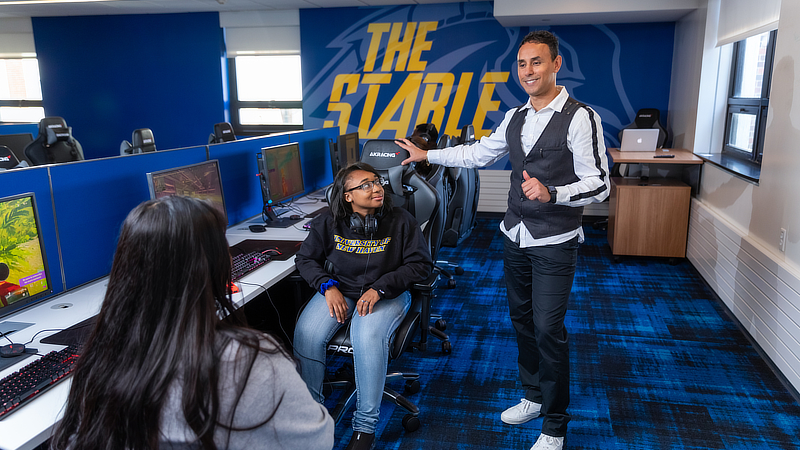

Video games and interactive media are an integral part of many of the hottest professional fields today, including education, healthcare delivery, mental health interventions, police training, and numerous industries just to name a few. Those who engage with games, whether for professional purposes or recreation, are dependent on those with the creativity, visual skills, and conceptual thinking ability needed to design the games. Our B.A. in Game Design & Interactive Media will prepare you to pursue a career in the gaming industry.
Through our program, you will engage in a broad exploration of how games are built — both technically and artistically. You will work individually as well as in multi-player mode, collaborating with students from other programs and colleges to build your own games. To do this you will build and level up on skills that you develop in courses that focus on narrative, writing, music, visual arts, and more. You’ll use these skills to develop stories, create interesting characters, set rules, and present challenges that prompt interaction with the user.
Game development is a multi-disciplinary field, and you must understand each of the disciplines that go into it. You will wear many hats in game development — artist, writer, music expert, and more.
Our faculty are leaders and innovators in their fields, bringing both deep professional experience and academic rigor to the classroom.
Game Design & Interactive Media is one of several University of New Haven degree programs focused on gaming.
The information below is designed to show a few of the possible careers you could pursue with this major. Job titles and salary data are from the Occupational Outlook Handbook, a publication of the Bureau of Labor Statistics.
Special Effects Artist/Animator
16% Growth 2020–2030
Digital Designer
13% Growth 2020–2030
Art Director
11% Growth 2020–2030
An introduction to the study of games, gaming, and game culture. This course provides an overview and application of the perspectives, concepts, and methods of the diverse field of game studies (also called ‘ludology’) to provide students with a critical appreciation for games and associated phenomena.
This course surveys the basics of game history, game design, game engines, technical ethics, and project management. Students will have the ability to analyze games, identify game mechanics and game engines, and assemble interactive media using predefined assets and gaming modules.
A critical exploration of ethics, as an area of philosophy, and video games, as an interactive aesthetic medium. Students will cover ethical theory and video game theory; they will then focus on the theoretical intersection between the two, focusing on applied ethics and moral psychology. Students may also cover the ethics of video game design and the ethics of video game culture.
An in-depth examination of the problematic side of games, gaming, and gaming culture as well as possible solutions to those problems. Students explore the causes and consequences of important social issues as they relate to gaming contexts, like social bias, prejudice and discrimination, hate speech and harassment, and conflict between gamers.
As videogame creation becomes more accessible, people without programming experience can now create their own interactive experiences-digital games that prioritize artistic expression over commercial success. In this class, students explore this emerging art form of “punk games” by creating their own original digital games and examining existing repertoire and writings in this new media. The class will culminate in a public gallery of students’ games at the end of the semester.
A foundational course in the narrative methods and storytelling aspects of games. This course will introduce students to literary, rhetorical, and narrative theories that help us to understand games as story-driven media. Particular attention will be given to the ways that games both overlap and diverge from storytelling methods in other print and visual media. Students will study the narrative aspects of many different types of games and apply what they have learned to create their own narrative game.
The University of New Haven offers a wide variety of in-depth courses that create a transformational educational experience for our students. To view the complete list of courses you'll take while pursuing a Bachelor of Arts in Game Design & Interactive Media, check out the Academic Catalog:
Get an inside look at what differentiates the University of New Haven and how your experiences as a student will prepare you for success.



All University of New Haven students have access to the many resources available through the University’s Career Development Center, which has been named one of the best in the nation by The Princeton Review.
From career assessments, networking, and job shadowing to on-campus interviews and salary negotiation, the Career Development Center provides the skills and connections to identify a meaningful career and an opportunity to pursue your passion.
Learn More
The Charger Blog
As part of a recent mini conference the University hosted, game design and technology professionals from across Connecticut engaged in important discussions about the future of the industry, workforce development, and the "state of play" in Connecticut.
Whether you're still in high school or are transferring from another college, we offer full- and part-time opportunities for undergraduates from inside the U.S. and abroad. The admission process can begin as early as the end of your high school junior year.
The Application Process
We offer a comprehensive financial aid program, with students receiving assistance in the form of grants, scholarships, student loans, and part-time employment. Funds are available from federal and state governments, private sponsors, and from university resources. More than 85 percent of the University's full-time undergraduate students receive some form of financial assistance.
Learn More